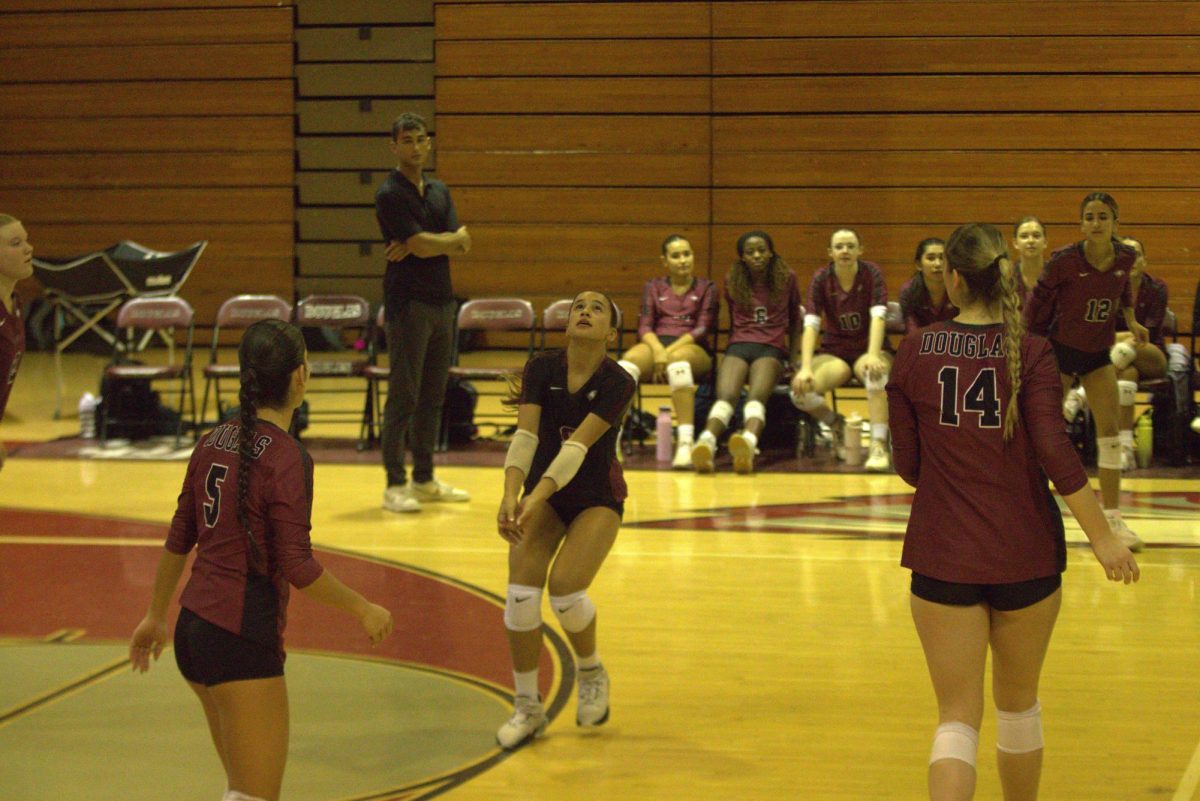Behind the Mask: Florida schools lift mask mandates; face coverings lead to new trends and harmful waste disposal
MSD welcomed about 3,650 students in the 2021-2022 school year, a 200+ increase from the prior year. This influx led to overcrowding, which commonly causes congestion during class changes, lunch and dismissal.
December 20, 2021
Smiles uplift the corners of a face. Worry lines on a forehead signify confusion over a concept. Dropped jaws mean surprise or shock. Facial expressions are a universal form of nonverbal communication used to display emotions and indicate intentions. Imperative to the social interaction of individuals, they are used as a measure of attractiveness and as a standard of body language. However, the enforcement of masks changed this across the globe.
Behind-the-Scenes
As a result of the ongoing COVID-19 pandemic, Broward County Public Schools required face coverings at the beginning of the school year for staff and students. This action defied Florida Gov. Ron DeSantis’ executive order stating school boards do not have the authority to institute a mask mandate. When the Florida Department of Education withheld funding from BCPS, the Biden administration sent $420,057 in federal grants through the U.S. Department of Education to the district on Sept. 30 to alleviate the financial burden.
According to the BCPS COVID-19 Dashboard found on their official website, schools within the district have seen a gradual decrease in COVID-19 cases beginning in mid-September. The database records the number of confirmed student and employee cases (currently over 3,500), which are then reported to Risk Management and Coordinated Student Health Services.
The highest instance of confirmed cases were disclosed on Aug. 23, 2021 with 99 students and 18 employees. As of Nov. 17, 2021, Marjory Stoneman Douglas High School has had 32 positive diagnoses.
Following a nationwide trend of dropping mask requirements, every school district in Florida has lifted their mask mandate throughout the beginning of November. For instance, while masks remained optional for many high schools and middle schools, grade school students in Miami-Dade County could opt out of wearing the face covering, with parental permission, starting Nov. 12.
“For the high school level, I think there was like a large majority that may have gotten vaccinated, which is why I don’t think it was too soon to lift [the mask mandate],” English teacher Lauren Rower said. “At the elementary level, they are going to lift it as soon as Thanksgiving break is over, which I think is too soon because they didn’t give everyone an opportunity to become fully vaccinated.”
The decision was influenced by decreasing COVID-19 cases and increasing vaccination opportunities for children. Nonetheless, the Center for Disease Control and Prevention recommends universal indoor masking of all individuals regardless of vaccination status.
“I like [the mask policy] we have right now where it’s optional. I would like to see this kind of thing remain throughout the rest of the year where no one feels pressured to wear it, but at the same time, if you are wearing it, it’s not like you’re being ostracized for it,” Rower said.
On the opposing side, the sentiment for maintaining mask mandates remains strong in Washington and Delaware. Doctors and government officials reinforce the idea that the implementation of many precautions not only keeps children learning in brick-and-mortar schools, but better ensures their overall health and safety.
On vs. Off
Although many MSD students continue to wear their masks, others have decided to forgo the covering completely or don them in certain classrooms.
“I’m honestly fine with [the mask-optional policy] because I feel that wearing them has become more of a personal choice, especially for those who are vaccinated,” sophomore Abigail Varghese said.
According to a survey of 465 MSD students on the county’s mask optional policy, 60% state that they would continue to wear their mask; 20.6% stating they would not and 19.4% undecided. When asked about teacher consideration, 47.7% state they would most likely wear a mask if their teacher is wearing one in class; 15.7% stating likely.
“I usually wear a mask when I feel a little under the weather. In certain situations, I also wear masks if a teacher seems to prefer it,” Varghese said. “I feel that students should be considerate of teachers because that teacher wants to feel safe and protected in their classroom, and it isn’t really a hard compromise to wear a mask for a class period.”
A common complaint regarding the consistent wearing of masks involves voice projection, facial expressions and respiratory issues. With the bottom remainder of faces completely covered, it is hard to interpret whether a student understands the lesson or not.
“It’s definitely easier to see their mannerisms and facial expressions to get to know them on a different level than if we were all wearing masks,” Rower said.
Oftentimes, teachers may have health problems, young children at home or a smaller classroom, all of which can influence their enforcement of a mask within their teaching parameters. In more spatial settings, individuals may feel more comfortable because desks are placed farther apart.
“While I can no longer enforce that students wear masks, I [asked] them to continue to,” history teacher Michael Nastasi said. “I have individuals in my life who are older or too young to get vaccinated, so I would like to limit my risk to them as much as possible.”
Regardless of the maximum capacity of a classroom, teachers and students alike choose whether they wear their masks. Realistically, many pick and choose when and where they choose to do so, depending on their level of comfort or discomfort.
Mislead or Deceive?
The global wearage of masks have introduced the concept of “mask fishing,” or the misconception that someone looks better with only the upper part of their face showing in comparison to their overall features. Essentially understood as looking better with a mask than without, the phenomenon has reached a variety of social media platforms and affected adolescents today.
“My opinion about mask fishing is that it’s very misleading to many people, but others might say that it tricks people into thinking someone looks a certain way without their mask,” freshman Isabella Gestro said.
A variation of “catfishing,” the new phrase emerged on TikTok, a popular social networking service. Individuals take videos of themselves taking off their mask and asking the rhetorical question, “Am I mask fishing?” to gather opinions from viewers. In the comments, people are generally truthful in their judgment; however, personal preferences and expectations must be considered.
This trend results in two outcomes: you look better than expected beneath your mask or worse.
“Once my friend had liked this kid for a while but then one day, she saw him take off his mask at lunch and she had lost interest after she had found out his personality, along with the ‘mask fishing,’” Gestro said.
In other cases, the lower portion of faces may match the image people envisioned. While some may purposely wear their masks to cover what they consider undesirable features, others view face coverings as a barrier to their social welfare.
Disastrous Disposal
Walking to and from the junior lot, or parking space at North Community Park, students may notice the prevalence of discarded masks lying along the pathway or grass. Instead of consulting a trash can or holding onto the face covering until you can properly discard it, people are littering.
“I think it’s really sad that people just throw their masks on the floor. They’re being lazy, just throw it out,” junior Ava Miller said.
While pollution and climate change are already global problems, the addition of incorrect mask disposal negatively affects the environment around MSD.
“I don’t like any littering, especially mask littering. I know sometimes, especially at lunch, you might have your mask off and you might forget,” environmental science teacher Adeena Teres said. “It’s so easy to pick it up and then throw it into a trash can, so I don’t understand why it’s so hard for people to do.”
The type of material a mask is made out of influences how fast it can biodegrade, or decay in a natural and non-harmful way. According to the Society of Environmental Toxicology and Chemistry, the majority of face coverings are manufactured from long-lasting plastic materials that could persist in the environment for decades to hundreds of years.
“You have the little loops that go around your ears, so you have to be careful of animals getting in there and getting stuck,” Teres said.
There is a direct correlation between the use of personal protective equipment and mask littering. Overtime, disposable masks can be broken down into microplastics. Through a chain reaction, marine animals may digest these toxic substances and potentially infect human food.
To mitigate this issue, organizations such as National Honor Society conducted a cleanup to remove trash and other waste products along the pathway from North Community Park to MSD. The project is significant because it brings the community together, while making the city and neighboring areas cleaner and less polluted to maintain the local ecosystem.
“Logan Hibshman, the other organizer, and I are very fond of the environment and we want to do everything we can to keep our community clean,” NHS Co-Parliamentarian Dylan Lopatin said. “We have a lot of diverse wildlife as we are very close to the Everglades, and we are trying our best to do our part to keep the animals and plants safe.”
Information regarding the cleanup initiative was sent through Remind, a communication platform. The event took place on Sunday, Nov. 28 from 9 a.m. to 11 a.m. NHS provided the volunteers with garbage bags and gloves.
Approximately 65 students signed up to volunteer, which aided in the fulfillment of their NHS club hour requirement and official service hours.
With the help of students at MSD and increased awareness about mask littering, the community can become more proactive to alleviate this global issue. Although the effort will take time and action, the environmental affair must be addressed for the well-being of our future.
In Summary
All in all, the introduction of masks has influenced several reactions, trends and legislative actions. Recently, the Florida legislature passed a law, signed by DeSantis, forbidding school districts from passing mask mandates and prohibiting governments from enacting vaccine requirements for public-sector employees. These measures expire June 1, 2023.
Moreover, the new Omicron variant is projected to spread more easily than the original SARS-CoV-2 virus. The CDC continues to actively monitor the variant by gathering more data and test samples to further study the genetic make-up of the virus and seek effective treatments.
Current vaccine options are expected to protect against severe illness, hospitalizations, and deaths; however, they do not guarantee immunity. Health organizations continue to advocate for vaccinations and daily mask wearage.
Although Florida schools have completely lifted mask mandates, the pandemic continues to bring an onslaught of new changes in the social, emotional and physical practices of everyday people.











